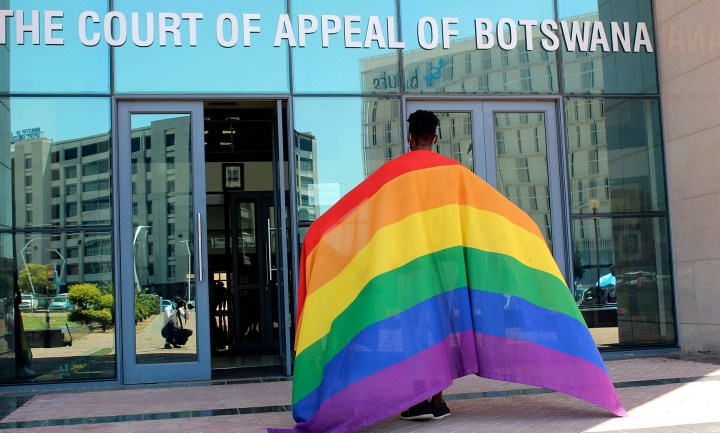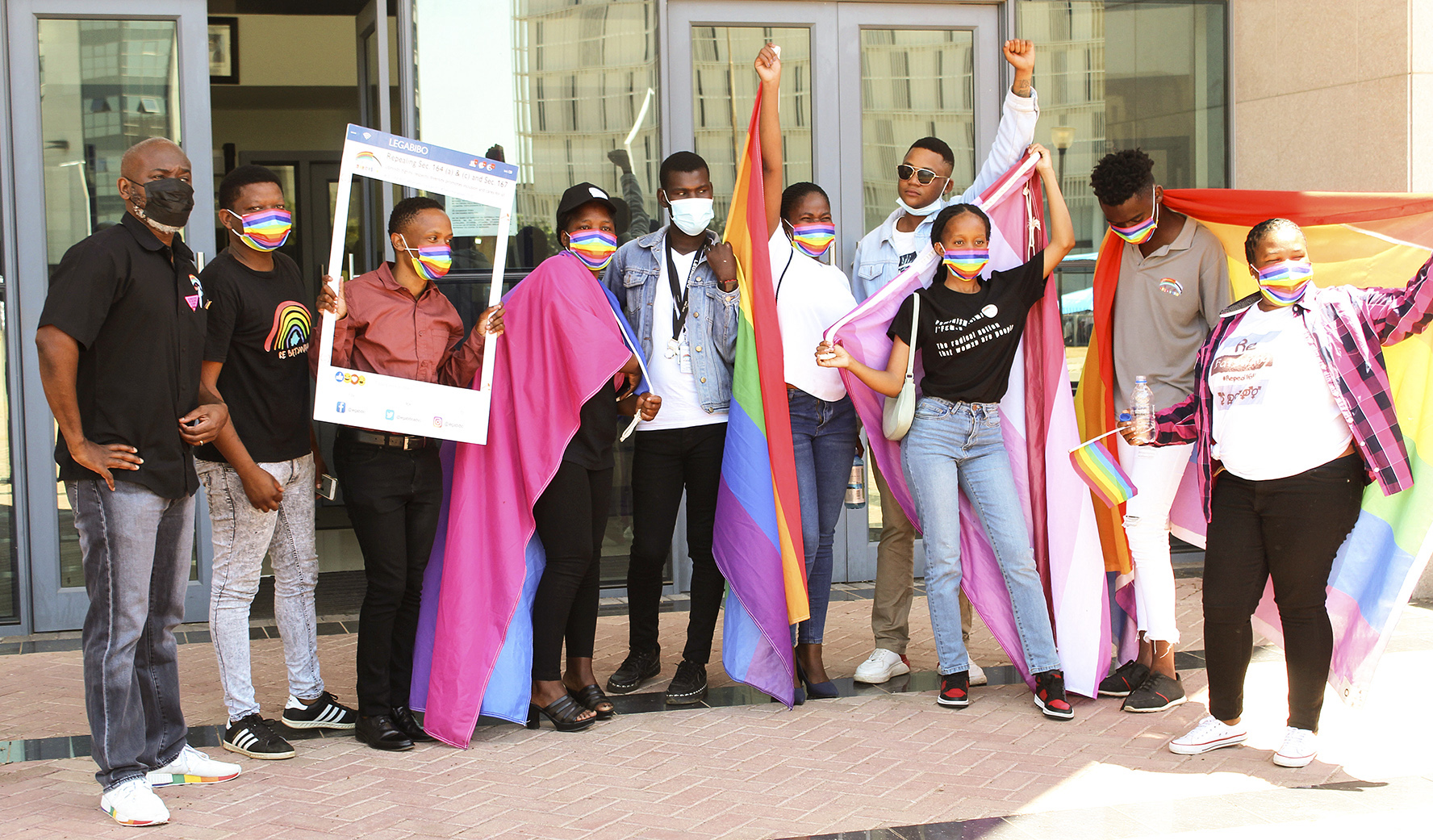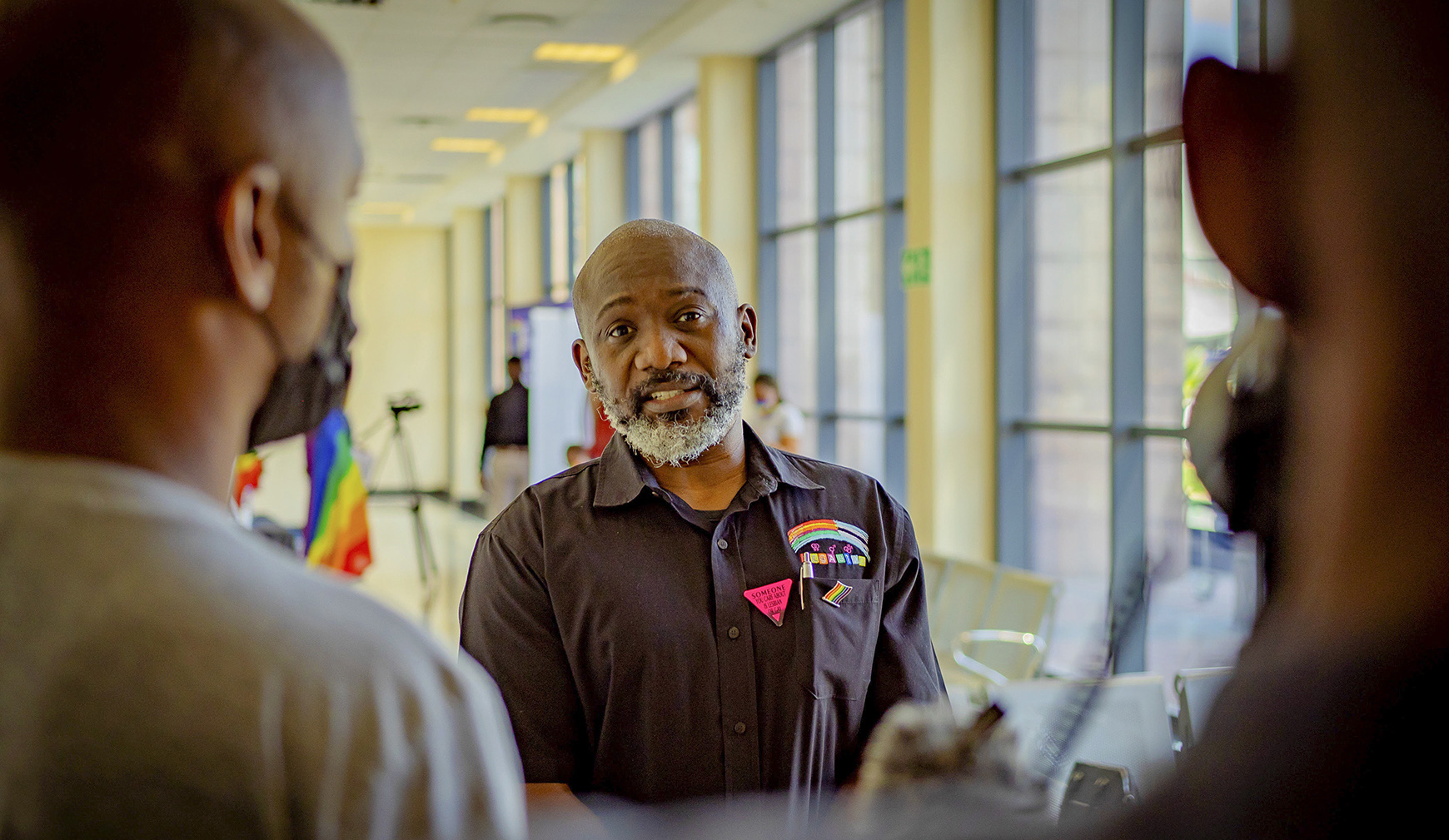OUT IN AFRICA (PART ONE)
Botswana court’s same-sex ruling: A young man’s victory offers hope for queer Africans

A series of four articles examine issues of policy, laws, rights, culture, popular culture, language, stigma, crimes, discrimination and individual experience of the queer community in four African countries.
Six years ago, at the age of just 21, Letsweletse Motshidiemang decided to launch a legal challenge against the Botswana government. Soft-spoken and measured in tone, Motshidiemang explains his decision to challenge sections of the country’s penal code which criminalises same-sex sexual relations.
“You know when you have fully accepted who you are and have made peace with your sexuality? I got to that point and just felt it was only right for me to fight for my rights in a proper way… That’s why I took the government to court.”
It worked in his favour. On 11 June 2019, the Gaborone High Court ruled that these sections of the penal code — which imposed a maximum sentence of seven years’ imprisonment for consensual same-sex relations — were “discriminatory because they take away the only means of sexual expression of the applicant” and violate his right to “liberty, privacy and dignity”.

Queer rights activists celebrate outside the Botswana Appeal Court after the ruling. (Photo: Supplied)
In handing down his judgment, judge Michael Leburu said it was “not in the public interest” to criminalise same-sex sexual conduct.
“What compelling public interest is there necessitating such a law? There is no victim… The state cannot be sheriff in people’s bedrooms,” the judge added.
Unhappy with this ruling, the Attorney-General appealed the decision, arguing that these sections of the penal code were not discriminatory as they were aimed at a specific sexual act, “whether this was committed by a homosexual person or a heterosexual person”.
The Attorney General also argued that “if indeed the attitudes of Batswana had changed towards gays, then this was a matter [to be decided by] Parliament and not by the courts”.
On Monday 29 November, however, the courts again found in Motshidiemang’s favour.
These sections of the penal code, it ruled, “have been rendered unconstitutional by the march of time and the change of circumstances [and] only stigmatise gay men unnecessarily… has a harmful effect on them… and serve only to incentivise law enforcement agents and others to become keyhole peepers and intruders into the private space of citizens”.
“I was a bit nervous,” Motshidiemang says, a few hours after the ruling. “The feeling I had today was the very, very same feeling I had on the 11th of June 2019. So many things will be going on… just thinking about this whole case. ‘What will happen if I lose this case?’ ‘What will happen if I win?’ Those are the kinds of questions that I normally ask myself. And, you know, sometimes I even avoid social media, because I know people have a lot of things to say on social media.”
A few hours earlier in the courtroom, a smattering of queer folk sit anxiously awaiting the ruling. Immediately after the ruling is handed down, the room explodes. A fist is pumped into the air (“We did it!” one person shouts), fingers are snapped, there is ululating and rainbow flags are waved. Overcome with joy, one man bursts into tears.
“I’m so embarrassed I cried in public,” Caine Youngman says later. “It’s just that I can’t believe this happened in my lifetime. I mean, I’ve dedicated about 17 years of my life to do all of this and, I don’t know, it was just so emotional.”
Youngman is head of policy and legal advocacy with the Botswana queer rights organisation, LEGABIBO, which joined the case as a friend of the court.

Queer rights activist Caine Youngman at court. Youngman says the ruling is the culmination of more than 17 years of work. (Photo: Teto Mokaila Photography)
“I feel assured,” Youngman says of the ruling. “I feel assured by the courts that my rights as a member of the LGBT community are respected. I feel assured that there is a place, or an institution or a mechanism that is always willing to listen; to lend us an ear when we are crying.
“I’m also hopeful. I’m hopeful in the sense that this judgment will be a challenge to other leaders, especially politicians. This ruling should say to them, ‘You have to prioritise human rights. You have to treat everybody as equal. You have to be able to stand for the minority’.”
Anna Mmolai-Chalmers is the LGBTI Sexual Programmes Manager at the Southern Africa Litigation Centre based in Botswana. “I’m really, really excited about the ruling today. It’s a great day for human rights. It’s a great day for members of the LGBT community,” she says.
Thato Semele is a queer rights activist who, last year, started an annual queer gathering called Queermas.
“The festive season is supposed to be a time to be merry, to spend with our loved ones. But it’s not as black and white for most queer people,” Semele explains. “Some queer people have been thrown out of their homes, some queer people just decide it’s better to not even go home. Some queer people cannot even afford to go home. So we decided we can just, you know, have our own Christmas. Hence ‘Queermas’.”
The ruling will no doubt make this year’s iteration of Queermas “merrier”, she laughs, adding: “It is definitely a great time to be alive.”
The 35-year-old, who identifies as pansexual, says that, because she is cis-gendered, life as a queer person in Botswana “hasn’t been as hostile for me, personally”.
“But,” she adds, “I have seen people who have been let go because of how they identify… Attitudes are really hostile here. Batswana in general can be homophobic. They may not act it out as physically and as violently as it happens in other countries, but they are very violent in terms of how they would speak to queer people; how they choose to identify them, and how they choose to, you know, enforce their own beliefs and our own religions on to queer people… So it’s just a hostile environment in general.”
As to whether this most recent ruling will help shift societal attitudes, Semele is cautiously hopeful.
“Changing people’s mindset and their beliefs — these beliefs that have been imbued in them for, like, thousands of years — is not going to be a [simple] switch. But I feel like, to some extent, it will. Because, you know, you can’t exactly hide behind it being a crime anymore. So you kind of have to respect the other person’s existence.
“I think [the ruling] was a long time coming,” she adds. “I feel like all the sitting judges were kind of in agreement that those penal codes are archaic and outdated.”
A Human Rights Watch report titled, This Alien Legacy — The Origins of “Sodomy” Laws in British Colonialism, found that many of the countries that outlaw same-sex relations do so “because they once were British colonies”.
“[The British] brought in the legislation… because they thought ‘native’ cultures did not punish ‘perverse’ sex enough. Section 377 [of India’s penal code, which was abolished in 2018] was… a colonial attempt to set standards of behaviour, both to reform the colonised and to protect the colonisers against moral lapses.
“It was also the first colonial ‘sodomy law’ integrated into a penal code… Its influence stretched across Asia, the Pacific Islands and Africa — almost everywhere the British imperial flag flew.”
The list of African countries which inherited versions of this law is expansive: Gambia, Ghana, Kenya, Lesotho, Malawi, Mauritius, Nigeria, Seychelles, Sierra Leone, Somalia, Swaziland, Sudan, Tanzania, Uganda, Zambia, Zimbabwe and, of course, Botswana.
The Botswana ruling offers the rest of the continent’s queer folk much hope. And, according to Youngman, there are possible lessons to be learned in how this victory was achieved.
“What we adopted was an incremental approach, where we started very small,” says Youngman. “We started with the most basic things, like research. Then we went into lobbying some of the government departments to do research that speaks about us. Then we moved from there to ask them to include us in policies, based on those research findings. And then from the policies, we got smaller laws, like the Employment Act which changed in 2010 [to outlaw termination of employment based on sexual orientation].”
There were also other victories. In March 2016, the Botswana Court of Appeal ordered the Registrar of Societies to register LEGABIBO as an NGO. The court ruled that “the refusal to register LEGABIBO was not only unlawful, but also a violation of the right of LGBTI activists to freely associate”.
In 2017, the Botswana High Court also ruled in favour of two transgender persons: a trans man was allowed to change his gender marker and a trans woman was issued with a new identity document marking her as female.
“So, in the end,” says Youngman, “all of these things combined… built up to today’s ruling.”
As to what the organisation will be tackling next, Youngman says: “The next step now is to teach the LGBT community, the general community and [our] leaders about the judgment and what it means. Thereafter, at some point, we will go back to the community and sit around the table and discuss what we need to take up next. Once we have internalised this judgment, we can then sit around the table and discuss amongst ourselves what’s next [and] what we need to do to build towards it.”
Whatever the next step is, Semele hopes for an expeditious result.
“You know, I’m hoping we’re not going to take another thousand years for us to change other laws,” she says. “You know, like the Marriage Act, the Adoption Act… We are hoping that we don’t have to fight for those things to be seen as archaic.”
Although happy with the ruling, Motshidiemang says the years of sticking to his proverbial guns have been far from easy.
“You get called all kinds of names,” he says, recalling the pushback he got when first setting out on his fight. “Like, ‘what you are doing is a sin’ or ‘homosexuality is a sin’. Or, we are not children of God. Or, we do not belong to the kingdom of God. All those things. And, you know, I’ve never — not even once, even when someone shows me the comments — I’ve never responded to anyone. No matter how angry I became. I just made sure that I avoided responding to them, because I wanted to fight a good fight,” he says.
A slight pause later, he adds: “I feel proud of myself for doing what I did.” DM


















 Become an Insider
Become an Insider
Comments - Please login in order to comment.